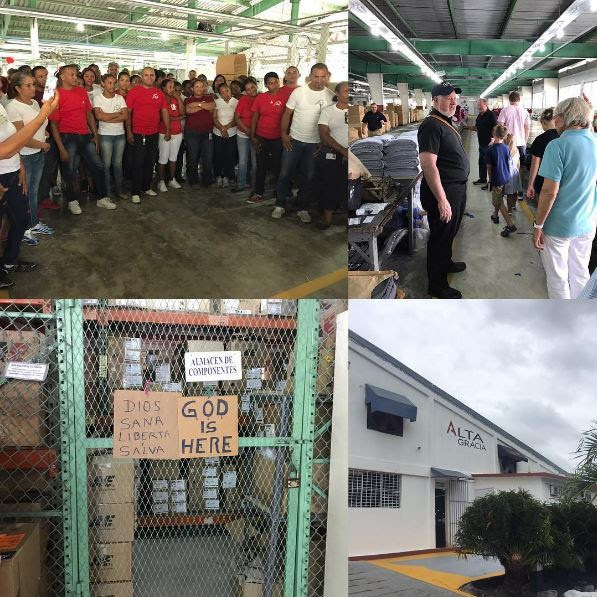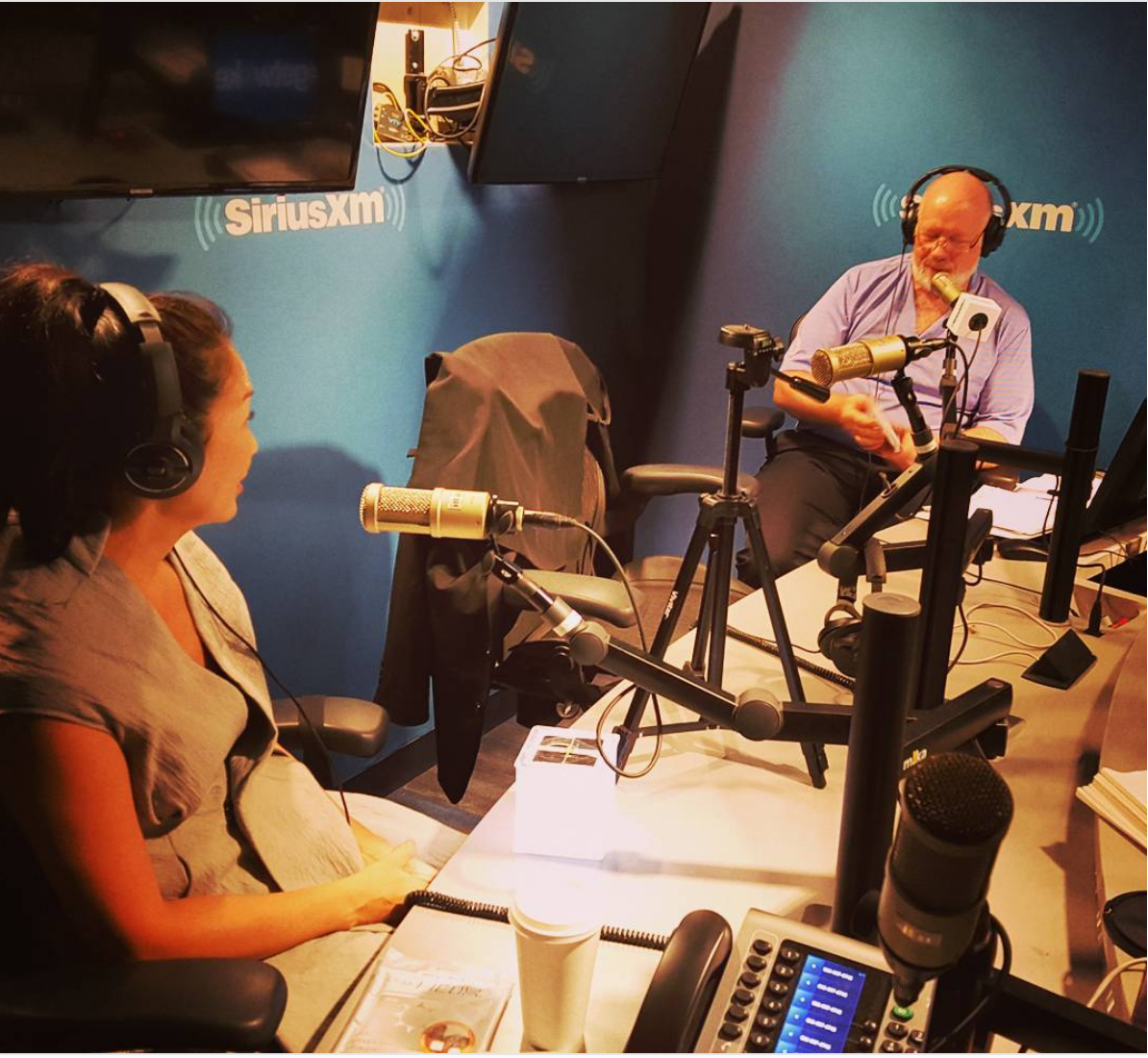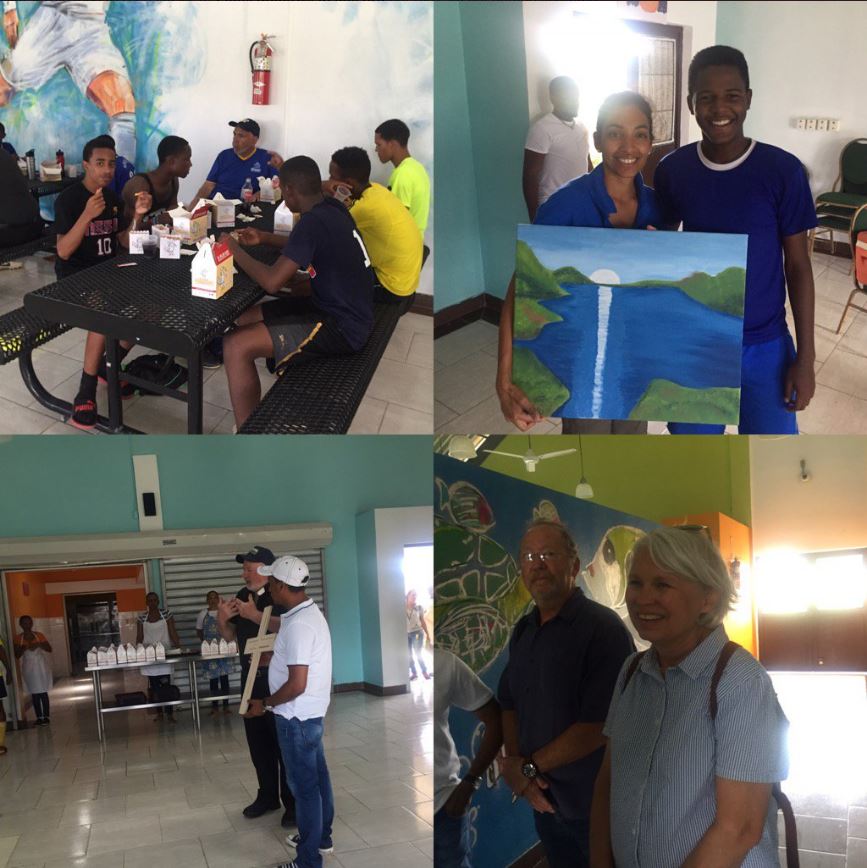
Villa Altagracia – Apparel Factory & Workers – Day 4
The day began with three generations of the Hodge family, 11 of us, and luggage, crowded into a mini-bus for a two and a half hour trip from La Romana to Villa Altagracia in San Cristobal, located outside of Santo Domingo. The driver had an interesting approach that included driving ten miles in the wrong direction, slowing down on open highways and speeding up in crowded city streets. Oh well.
We arrived at the factory in Villa Altagracia at mid-morning. Although I had visited the factory on my own about five years ago, this visit would be different because I was with “the boss,” Donnie Hodge, who is the owner of Altagracia Apparel. I’ve done more than a few visits in the Archdiocese of New York with Cardinal Dolan to know you get a different perspective when “the boss” shows up. You need to do some reading between the lines to get a true feel. What I experienced when we walked into the factory was spontaneous applause and affection for “the boss.” Even allowing for some “brown nosing.” The applause was overwhelming and in waves as we walked through different sections of the factory. While this was heartening for me, I checked out the faces of Donnie’s family and saw how much more moving it was to visit the job of her husband, their dad and granddad for the first time.
We saw over 130 workers, men and women hard at work in a factory that was well ventilated, bright and had sufficient work space for each worker. What are they making? Think college bookstores, think Dallas Cowboys. They are making t-shirts, polos, hoodies with customized logos we all have seen in stores and on people. Maybe the next item you buy with the Dallas Cowboys or Notre Dame logo will have been made at Altagracia’s factory with fair wages and working conditions. An extra bonus was the upbeat salsa music (I think) playing a little above background levels throughout the plant. Given my previous visit, I was not surprised by what I saw today. I took away the same positive impressions. I was told by the local plant managers that 90% of the workers I saw five years ago were the same ones I saw this morning. Fair wages and decent working conditions seem a good antidote to high turnover and costly retraining. Rudy and Adriana, the local managers, demonstrated professionalism, leadership and concern for their workers, who could serve as an exemplar for many other sectors.
Although I did speak with a few workers last time n the factory this time we were able to visit three families in their own houses. I am very happy that Donnie wanted us to see the difference that a decent job can make in the lives of families and communities. Being with his family added a delightful and important element. It concretizes what “passing it forward” and “family values” should be all about.
Villa Altagracia is about 30 minutes northwest of the capital of Santo Domingo and about 25% of the way on the highway to Santiago. It has four areas: “farming” on the outskirts (which we did not visit); a busy chaotic retail shop-laden main street, an industrial park where the Altagracia Apparel factory is located, and a residential area behind the main commercial street. This residential area is a small pueblo of 85,000 residents with an extremely high unemployment and underemployment rate. This magnifies the importance of the jobs at the apparel factory.
Our first stop outside of the Altagracia factory was a laundry business set up by one of the workers at the factory. She is the factory worker, her husband the manager of the laundry, her daughter the assistant and two of her neighbors are employees. According to her, this is only made possible because of the job at Altagracia Apparel. NB – She still works at the factory.
Then, we were off to the home of another one of the workers. The first stop on this part of the visit was a rundown, dark, one-room, leaky shack in the backyard of a very decent house. What we learned was simple and straightforward: the now backyard shack was the prior house of the Altagracia factory worker and the new decent house was built over a few years with the wages earned at the factory. This new house is not grand in the overall scale of things, but it is “grand” compared to the prior residence and other houses in this barrio. It was clean, neat and provides separate kitchen, living (TV room) and sleeping places for the family.
The other two families we visited had overall similar stories – with a few differences. Here’s the story of one particularly enterprising, enthusiastic and effusive Altagracia Apparel worker. She fixed up her former one-room “shack-house,” which is in the front yard of the family’s new two story multi-bedroom house. She is renting this one room and – I was told – charging “below market” rent based on the amount the man can afford. She definitely got the point of the parable of the unjust steward in the Gospel. There is more to her story. She also purchased a car which she leases out as a taxi to another neighbor. If UBER expands to Altagracia, she may be a candidate for their local manager – although I caution they certainly will need to match the decent job conditions of Altagracia Apparel if they hope to attract her or any of her co-workers.
I mention one other item that would have completely escaped me if Luz Tavarez hadn’t pointed it out. In the kitchen of one of the homes were more than a dozen bright shining pots of different sizes and types clearly displayed at the top of a cabinet. Luz told us of the great pride Dominican women take in having “shiny” pots. In fact there is even a cottage industry of “pot shiners” called by a specific Spanish job title that I forget. I mention this because of the “spill-over” impact of decent work on human dignity and self-esteem. In the prior one-room leaky shack there was no space for this display of an important sign of pride in this culture – and now there is. There’s no other way but to see this as valuable progress!
Let me mention a few things that ran through the entire visit – family, God and gratitude.
Family: At every step of the way, the positive impact of these jobs on not only the worker, but the children and spouses, was both evident and articulated. More than one worker thanked the family of Donnie Hodge for their sharing of their boss’s time and energy with them to develop and maintain the factory. Not a bad understanding of the importance of family and the sometimes difficult trade-offs between work and family that people must make – in very different circumstances!
God: without embarrassment or hesitation, all were willing to say “gracias a Dios” (thanks be to God) for the blessing of these jobs. Gracias a Dios was intermingled throughout. I mention that Donnie Hodge and his family are deeply believing Christians. They are not Catholics. This highlights that the work and partnerships of Catholic Charities extends to “non-Catholics and Catholics alike.
Gratitude: More than a dozen times, a thank you was given to Donnie Hodge and his company for sticking with this factory even through hard times. I have seen enough to confidently say that this was more than merely currying favor with the boss.
At the other two stops on my trip, I presented a cross blessed by Pope Francis during his visit to New York for immigrants and refugees helped by Catholic Charities as a sign of solidarity and support for the dignity of workers. Solidarity across national boundaries is an important part of the work of Catholic Charities in New York. Immigrants from more than 100 different countries are helped each year. Immigrants and first generation families from the Dominican Republic are an important part of Catholic Charities’ work – not only in New York City but also the Hudson Valley. I am confident this “cross of solidarity” will be prominently and proudly displayed.
I think you get a sense of our uplifting visit yesterday to the factory of Altagracia and the homes of a few of the workers.




